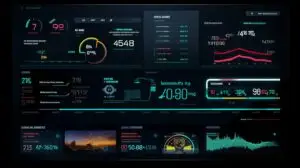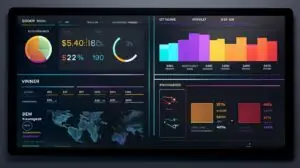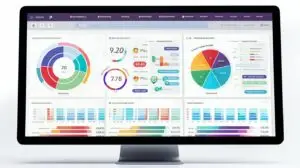Welcome to the future of car dealerships! The auto dealer system has revolutionized the automotive industry, and digital signs play a crucial role in enhancing the customer experience and driving sales in modern car dealerships.
Digital signs can be strategically placed in customer lounges, showrooms, and service drive areas to engage and inform customers. They can display dynamic content such as special offers, new vehicle features, and service promotions, keeping customers informed and entertained while they wait.
Key Takeaways:
- The auto dealer system is transforming car dealerships and the customer experience.
- Digital signs can enhance in-store marketing efforts and provide valuable information to customers.
- Effective use of digital signage can boost sales and drive foot traffic to the dealership.
Enhancing In-Store Marketing with Digital Signs
Car dealerships can improve their in-store marketing efforts with the use of digital signs. Research shows that digital displays in automotive retail spaces can increase customer engagement by up to 400%. With the use of dynamic visuals, dealerships can create an immersive experience that showcases their brand and products to potential customers.
Digital signs located in customer lounges, showrooms, and service drive areas can be used to inform and engage customers. For example, they can display current promotions, special offers, and new vehicle releases. Dealerships can also use digital signs to provide informative content such as vehicle specifications, service offerings, and dealership history.
Digital signs can enhance the overall atmosphere of a dealership, creating a sleek and modern ambiance that appeals to customers. They can also be used to entertain customers while they wait, displaying videos or interactive content that keeps them engaged.

“Research shows that digital displays in automotive retail spaces can increase customer engagement by up to 400%.”
The versatility of digital signs allows dealerships to tailor their marketing messaging to different customer segments and optimize their marketing strategies. By incorporating digital signs into their in-store marketing efforts, car dealerships can create an immersive and engaging experience that maximizes customer satisfaction and drives sales.
Streamlining Operations with Auto Dealer System
To stay competitive in today’s fast-paced automotive industry, car dealerships need to optimize their operations by adopting advanced technology solutions. An auto dealer system is a comprehensive software suite designed to streamline various aspects of dealership management, including inventory management, sales processes, and customer relationship management. By utilizing car dealer software or dealership management software, dealerships can boost their efficiency, reduce operational costs, and provide a superior customer experience.
An auto dealer system can help dealerships manage their inventory levels more effectively by automating critical tasks such as vehicle tracking, ordering, and reconditioning. Dealerships can also access real-time information on inventory status, vehicle location, and availability, enabling them to make informed decisions and optimize their sales and marketing efforts.
| Benefits of Auto Dealer System | Features of Car Dealer Software and Dealership Management Software |
|---|---|
| Optimizes inventory management | Automated inventory tracking |
| Streamlines sales processes | Lead management |
| Improves customer relationship management | Analytics and Reporting |
In addition to inventory management, an auto dealer system can also help dealerships streamline their sales processes and customer relationship management. By utilizing a comprehensive auto dealership CRM, dealerships can manage leads, track customer interactions, and automate follow-up efforts to ensure higher conversion rates and customer satisfaction.
An auto dealer system is an essential tool for any modern car dealership looking to remain competitive in the digital age. By leveraging the power of technology, dealerships can enhance their operations, boost their profitability, and provide a superior customer experience.

Improving Inventory Management with Automotive Inventory Management System
Effective inventory management is crucial in a modern car dealership, as it can impact sales and profitability. An automotive inventory management system can help dealerships streamline inventory operations and gain better control over their stock.
The system can provide real-time inventory information, including availability and location of vehicles, which can improve customers’ buying experience. Dealerships can also optimize their inventory levels, reduce excess stock, and avoid stock-outs, resulting in reduced carrying costs and increased profits.
The automotive inventory management system can also help dealerships track their vehicles’ maintenance history, ensuring that they are in good condition for sale. This information can be used in marketing and sales efforts, highlighting the vehicles’ roadworthiness and reliability to potential buyers.
The system can help dealerships manage their fleet, plan for future purchases, and analyze their inventory trends to make informed business decisions.
Optimizing inventory management is a key component of a successful car dealership. An automotive inventory management system can provide dealerships with the tools they need to manage their inventory efficiently, improve customer experience, and increase profitability.

Optimizing Vehicle Sales with Auto Dealership CRM
The auto dealership CRM is a powerful tool for optimizing vehicle sales processes. It helps dealerships track leads, manage customer interactions, and improve follow-up efforts to ensure higher conversion rates and customer satisfaction.
The CRM system allows sales teams to easily manage leads and prospects by tracking their movements and preferences throughout the sales process. This information can be used to tailor sales pitches and marketing efforts to the specific needs and wants of each customer, ultimately resulting in higher sales and customer retention.
The auto dealership CRM can help improve lead response time by automatically sending personalized follow-up messages to potential customers. This ensures that no lead falls through the cracks and every opportunity is maximized.
By optimizing vehicle sales processes with an auto dealership CRM, dealerships can improve their overall sales performance and increase customer satisfaction. This ultimately leads to a more profitable and successful dealership.

Enhancing Online Presence with Dealership Website Design
A well-designed dealership website is a crucial element for any modern car dealership. In today’s digital age, potential customers are more likely to research and browse online before making any purchases. Therefore, having an attractive and user-friendly website can significantly impact a dealership’s online presence and drive increased foot traffic to the physical dealership.
Effective dealership website design should include a comprehensive inventory search function, customer reviews and ratings, and a clear value proposition that highlights the dealership’s competitive advantages. It should also be mobile-responsive to accommodate mobile users who make up a significant portion of online traffic.

A well-designed website should also be optimized for search engines, making it easier for potential customers to find and locate the dealership online. Ensuring the website has relevant and high-quality content and utilizing keywords in meta titles, descriptions, and image alt tags can significantly improve a dealership’s search engine ranking.
With an effective dealership website design, dealerships can attract and engage potential customers, increase online inquiries, and ultimately drive sales both online and in-store.
Effective Lead Management with Automotive Lead Management
Efficient lead management is a critical aspect of running a successful modern car dealership. With the increasing competition in the market, it is essential to capture and manage leads effectively to ensure a steady stream of sales. This is where automotive lead management systems come in.
Using an automotive lead management system can help your dealership capture and track potential leads through various channels, including online inquiries, phone calls, and walk-ins. By collecting and organizing these leads in one place, you can easily access them and manage them more effectively.
One of the key advantages of an automotive lead management system is the ability to improve lead response time. With real-time alerts and notifications, you can quickly follow up with leads and increase your chances of converting them into customers. Moreover, a lead management system automates many of the manual tasks involved in lead management, streamlining the process and making it more efficient.
In addition to lead capture and management, these systems can also help you nurture relationships with prospects and customers. By providing relevant information and personalized communication, you can build trust and loyalty, leading to increased conversion rates and customer satisfaction.

Adopting an automotive lead management system can significantly improve your dealership’s lead management practices and boost sales. By capturing, tracking, and nurturing leads effectively, you can increase conversion rates, build relationships with customers, and ultimately drive business growth.
Streamlining Operations with Dealer Management System
Car dealerships deal with various day-to-day operations that require streamlined management for the dealership to be successful. A dealer management system (DMS) is a software solution that helps manage different departments, such as finance, accounting, and human resources, among others.
A comprehensive dealer management system is necessary to optimize operations in a dealership, improve efficiency, and increase profitability. The system centralizes data, automates processes, and provides analytical insights to enable dealerships to make informed decisions.
The functionalities of a dealer management system vary, but an ideal system should address the dealership’s specific needs. A good DMS should provide the following:
- Real-time inventory tracking
- Automated reporting and analysis
- Intuitive finance management tools
- Comprehensive customer relationship management
- Streamlined document management and workflow
The dealer management system’s benefits can be maximized by trained employees who can effectively navigate the system’s features.
Adopting a dealer management system helps car dealerships manage their operations efficiently, reduce costs, and increase revenue.

Conclusion
Adopting an auto dealer system is crucial for modern car dealerships to remain competitive in today’s market. The use of digital signs can enhance the customer experience and increase sales, while an automotive inventory management system can optimize inventory and improve the availability of information for customers.
Auto dealership CRM and automotive lead management systems can help dealerships track, manage, and nurture leads to increase conversion rates, while a well-designed dealership website can attract and engage potential customers to drive online inquiries and physical traffic.
Using a dealer management system can streamline various dealership operations and improve overall efficiency. By embracing digital signage technologies and leveraging the power of technology, car dealerships can enhance the customer experience and drive sales in the modern automotive industry.
FAQ
Q: What is an auto dealer system?
A: An auto dealer system is a technology solution designed to streamline operations and enhance customer experience in car dealerships. It includes various software and hardware components that help manage inventory, sales processes, customer relationships, and more.
Q: How can digital signs enhance in-store marketing?
A: Digital signs can be used in customer lounges, showrooms, and service drive areas to engage and inform customers. They can display promotional offers, showcase vehicle features, and provide interactive experiences to enhance the overall in-store marketing efforts.
Q: What are the benefits of using an auto dealer system?
A: An auto dealer system can streamline operations within a car dealership. It helps with efficient inventory management, sales processes, and customer relationship management by providing features and functionalities tailored to the automotive industry.
Q: Why is effective inventory management important in a car dealership?
A: Effective inventory management ensures optimized inventory levels, accurate vehicle tracking, and availability information for customers. It helps minimize costs, prevent stockouts, and provide a seamless buying experience for customers.
Q: How can an auto dealership CRM optimize vehicle sales?
A: An auto dealership CRM system can track leads, manage customer interactions, and improve follow-up efforts. This leads to higher conversion rates and customer satisfaction by effectively managing the sales pipeline and nurturing customer relationships.
Q: What role does dealership website design play in the modern car dealership?
A: A well-designed dealership website is crucial for attracting and engaging potential customers in the digital age. It can increase online inquiries, drive foot traffic to the physical dealership, and provide a seamless online experience that reflects the dealership’s brand and offerings.
Q: How can automotive lead management systems benefit car dealerships?
A: Automotive lead management systems help car dealerships capture and track leads, improve lead response time, and nurture relationships with potential customers. This increases conversion rates and helps maximize sales opportunities.
Q: What are the benefits of using a dealer management system?
A: A dealer management system can centralize data, automate processes, and improve overall efficiency in dealership operations. It simplifies tasks in finance, accounting, human resources, and other areas, enabling dealerships to work more efficiently and effectively.
Sam Oscar is a distinguished freelance technology writer known for his unique blend of expertise in tech and a deep passion for automobiles. His writing career is marked by a plethora of articles, blogs, and reviews that explore the fascinating intersection of technology and the automotive world.
Sam’s journey began with a degree in Computer Science, but it was his lifelong fascination with cars that truly shaped his career path. He found his niche in writing about automotive technologies, combining his technical background with his enthusiasm for vehicles.
As a freelance writer, Sam has the freedom to explore a wide range of topics. His work often delves into the latest advancements in car technology, including electric vehicles, autonomous driving systems, and cutting-edge infotainment. Sam’s ability to explain these complex technologies in an accessible and engaging way has made him a favorite among tech and car enthusiasts alike.
His articles not only cover the technical specifications of new automotive technologies but also their impact on the industry, the environment, and society. Sam’s critical analysis helps readers understand the broader implications of technological advancements in the automotive sector.
Sam is particularly fascinated by the convergence of artificial intelligence, IoT (Internet of Things), and cars, often writing about how these technologies are revolutionizing the way we drive and interact with our vehicles.
In addition to his writing, Sam is an active member of several online tech and automotive communities, where he shares his knowledge and engages with fellow enthusiasts. He is also a regular attendee at major technology and car shows, keeping himself updated with the latest trends and innovations.
Sam Oscar’s work as a freelance technology writer reflects his passion for cars and his commitment to bringing insightful, well-researched content to his readers. His unique perspective makes him a standout voice in the world of technology and automotive writing.







